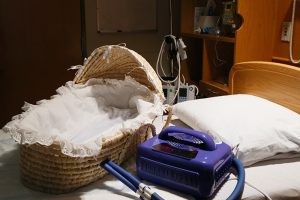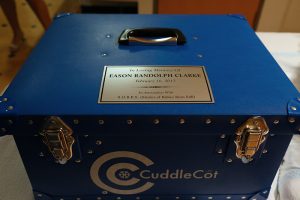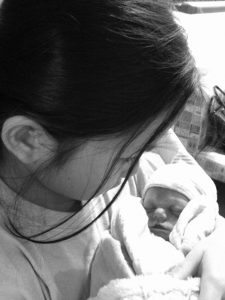In 2013, Debbi and Walt Clarke experienced the unimaginable loss of their third child, Eason, who was stillborn at 37 weeks. To honor Eason, the Clarkes recently donated two CuddleCots to the North Carolina Women’s Hospital to help families who suffer similar losses, making the hospital the first in North Carolina to offer them to families.

In 2013, Debbi and Walt Clarke experienced the unimaginable loss of their third child, Eason, who was stillborn at 37 weeks. To honor Eason, the Clarkes recently donated two CuddleCots to the North Carolina Women’s Hospital to help families who suffer similar losses, making the hospital the first in North Carolina to offer them to families.


by Zach Read – zachary.read@unchealth.unc.edu
Debbi and Walt Clarke were prepared to welcome their third child, Eason, to their family in March 2013. There was a chance he’d arrive early, as had their seven-year-old son, Redding. They’d excitedly decorated Eason’s room and guessed he’d be every bit as active as Redding, who is your typical, boisterous boy. They knew he’d be a great sibling to Redding and their oldest child, Emma Kate, who was also getting ready, sometimes reluctantly and sometimes joyfully, for another little brother.
Through February, Debbi’s pregnancy had been unremarkable. She’d bonded with Eason, feeling him grow, learning his sleeping and waking cycles, and becoming accustomed to the various triggers that made him move and respond. As she approached her due date, the kicks increased. Everything was normal.
Then, about three weeks before Eason was due, something changed. Debbi noticed that he wasn’t moving as much. She suspected he was fine and simply settling into his head-down position, but she wanted reassurance, so she called her doctor’s office.
“I went in for an ultrasound to make sure everything was okay, and it wasn’t,” says Debbi, who serves as special consultant to Provost James W. Dean Jr. at UNC-Chapel Hill. “As soon as the tech put the monitor on, he knew something was wrong – you couldn’t hear the heartbeat, and you couldn’t see any movement on the screen. He put his hand on my arm and said, ‘I’m sorry.’ That’s when everything stops and unravels.”
A Lightning Strike
Debbi had an exceedingly rare, asymptomatic condition in the placenta called massive perivillous fibrin deposition, or maternal floor infarction. Her doctor, Robert Strauss, MDUNC School of MedicineN.C. Women’s Hospital
“It’s a process in which a thick band of fibrin is deposited along the maternal floor of the placenta, thereby obstructing maternal blood flow through the placenta to the baby,” says Dr. Strauss. “Physicians don’t understand why this happens, and there’s no treatment for it. Sometimes the baby might not grow well and a provider may receive a hint because mom’s belly isn’t growing normally, but Debbi never exhibited any abnormal signs.”
Dr. Strauss was out of town when Debbi received the news, but they spoke by phone right away.
“He called our room and he cried with Walt and me,” recalls Debbi. “He grieved with us.”
During their conversation, Debbi discovered that fourteen years ago Dr. Strauss and his wife had also lost a baby: their twin girl, Gabriella, for whom the Gabriella Marie Strauss Meditation Consultation Room, located outside the Pediatric Intensive Care Unit at the North Carolina Children’s Hospital, is named. Gabriella was three months old.
“He understood,” continues Debbi. “He told me, ‘You’re going to feel like you want to make all these changes and do all these things that you weren’t doing before this happened, but nothing is going to make you feel better. Only time is going to help.’ He spoke from personal experience, and I feel like it has really shaped the way that he treats his patients.”
Hold Him as Long as You Want
Debbi describes the hours after receiving the news as a blur.
“You’re in shock,” she says. “There’s no script for it. The whole thing is surreal. You’re having conversations that you never imagined you’d be having.”
She told me that she wished she had held their baby and had spent time with him before he was taken away, and that if we wanted to, we should hold Eason for as long as we wanted. This was a big help to us.
She called Walt, who immediately joined her at the clinic. They had a choice of delivering Eason at N.C. Women’s Hospital later that evening or the following day, and they decided to be induced that night.
They pulled Emma Kate and Redding out of school for the rest of the day.
“Explaining to them what happened was especially difficult,” Debbi remembers. “They asked, ‘Why did he have to die?’ and that’s difficult to answer.”
News traveled fast to friends and family. On the way to the hospital to deliver Eason, Debbi received a call from a friend who shared that her firstborn son had been stillborn – something Debbi never knew her friend had experienced – and that she didn’t hold him after the delivery.
“She told me that she wished she had held their baby and had spent time with him before he was taken away, and that if we wanted to, we should hold Eason for as long as we wanted,” says Debbi. “This was a big help to us.”
Compassionate Care
At N.C. Women’s Hospital, Debbi and Walt received the care they needed before, during, and after the delivery. They were able to spend time with Eason. Debbi later learned that many families who experience similar tragedies aren’t able to have that time. At other hospitals, stillborn babies are sometimes quickly whisked out of the room by caregivers because of the rapid natural changes that occur to the baby.
“You read stories and hear accounts about how families and babies are treated with insensitivity at hospitals,” says Debbi. “It’s terrible.”
Rev. Darryl Owens, Women’s Services chaplain and a grief counselor in the Department of Pastoral Care at UNC Medical Center, was one of those who supported the Clarkes two years ago. He works alongside an interdisciplinary team of nurses, doctors, social workers, and others in the Perinatal Loss Program at N.C. Women’s Hospital.
“I met with Debbi before and after the delivery,” says Owens. “It’s a very sad time for our families, and our goal is to make certain that this is as meaningful an experience as it can be. We talk about what to expect after a loss like the Clarkes had with Eason. We want them to look back at this time and feel that they did everything they could to help prepare them for the grieving and healing process.”
After delivery, the Clarkes were able to hold and dress Eason, take pictures of him, and have his footprints done. Family members were allowed to be with them, including Emma Kate, who held the younger of her two brothers. The minister from their church in Raleigh was present to support them and baptize Eason.
Debbi believes that the compassion with which they were treated played an integral part in how she made it through delivering Eason and how she thinks about that day.
“It’s an unimaginable experience – and we were treated with kindness and compassion and love,” she says. “There was respect for our child and dignity given to him and to us. He only knew love and safety and peace in his existence here.”
Two Years
After Eason died, Debbi remembers one of the nurses telling her that it would take two years before she felt like a “normal” person again.
“Carrying a child is such a personal experience,” she says. “It’s even more personal after a stillbirth. I’d felt him move every day and felt him growing, and our family had plans for him. As my grief wore on, that was the most painful part of it – not having this person in our lives, not having a brother for our other children.”
For several months, she would take her kids to school in the morning and return home to get into bed. Nothing seemed to make her feel better. She struggled with questions about what she could have done differently and how she could have prevented Eason’s loss. Her father, Randy, for whom Eason received his middle name, Randolph, died 10 months after Eason was born.
“It was a very sad time,” Debbi remembers.
It’s an unimaginable experience – and we were treated with kindness and compassion and love. There was respect for our child and dignity given to him and to us. He only knew love and safety and peace in his existence here.
Then, one night, about a year and a half after Eason was delivered, Debbi received a text message from Walt while she was away on a trip. He told her that there was a movie that she needed to watch.
He texted, “I cried, but I’m glad I watched it. I think you need to watch it, too.”
Walt was referring to Return to Zero, a film written and directed by Sean Hanish. The movie is based on Hanish and his wife, Kiley, who lost their son Norbert in the final weeks of pregnancy.
Debbi watched the movie and that started to change things for her.
She researched the movie’s website and learned that Kiley Hanish holds retreats for grieving mothers. Debbi attended one of these retreats in Australia last spring, at the base of a volcano off the Gold Coast. These healing retreats incorporate spirituality and wellness activities, including yoga and healthy eating, and provide an opportunity for moms to talk about their experiences, which can often be difficult to do around family and friends who aren’t sure how to respond to such a tragic loss. The retreats also provide opportunities for mothers to bond with their babies who have died.
“On the retreat, we were able to talk about our experiences, our loss and our grief, without the discomfort of making others feel sad or uncomfortable or guilty,” says Debbi. “It was a way of operationalizing grief – taking that grief and understanding that it’s now part of you, but that it doesn’t have to define you. It’s part of your life, and you’ll never be the same, but that’s okay . . . When I got back home, I was able to visualize things that I could do in memory of Eason.”
CuddleCots

Debbi learned about CuddleCots from other mothers on the retreat. CuddleCots, more commonly found in hospitals outside the United States, are cooled bassinets, placed inside a Moses basket, that allow families to spend more time with a stillborn baby by slowing the natural decomposition that occurs to the baby.
Debbi remembers feeling distressed after delivering Eason because baby skin is so fragile and it started to change.
“I didn’t want my daughter to see that,” she says. “So, I had to cover him up because she was still holding him. As those changes progressed, we told the nurses, ‘It’s time – you can take him.’ These are the only memories you’re going to have with your child. For many parents of a stillborn baby, they’re not ready to say goodbye before their child has to be taken away – they want more time, and they shouldn’t have to feel anxiety about what’s happening to their child.”
As Debbi and Walt thought more about CuddleCots, they decided that they wanted to do something to help other families who are going through similar experiences. They reached out to Lori Esteves, of Stories of Babies Born Still (SOBBS) and the U.S. CuddleCot Campaign Initiative, and they began the process of donating two CuddleCots to N.C. Women’s Hospital. On September 25, 2015, Debbi visited the hospital to share thanks with the staff for the care she received when Eason passed away and to present two CuddleCots in his memory.
Darryl Owens, Emily Jackson, nurse manager for labor and delivery at the hospital, and nurse Sarah Howell were on hand for the presentation.
It’s been more than two years and we have healed. I do feel much better, but I miss Eason and I think about him every day. The word ‘normal’ gives me pause; you’re never normal after you have a baby, even and especially when your baby dies. Having a baby changes everything, every time. Parenthood guarantees that.
“It’s wonderful,” says Owens, who will share Eason’s story with families who are facing the unimaginable loss of a baby. “This will help other patients feel less alone and isolated in their grief, and it might take some of the anxiety these families feel about their baby changing appearance, allowing them to focus on the limited time they have with their child.”
Dr. Strauss is part of a core group of physicians, nurses, social workers, and counselors, including Darry Owens, who strive to take special care of families who lose babies.
“Debbi is a part of this group,” he says. “What has impressed me so much about her is that she’s helping others after her experience. She’s making a difference for people who want to know that their child was loved by us, had a place and a purpose, and was an important part of their lives.”
For Debbi, it’s fitting for UNC to be one of the first hospitals in the country to make CuddleCots available to patients.
“It’s symbolic,” says Debbi. “It sends a very clear message to a family that the hospital is honoring your time with your baby, and that the family should take as long as they need.”
